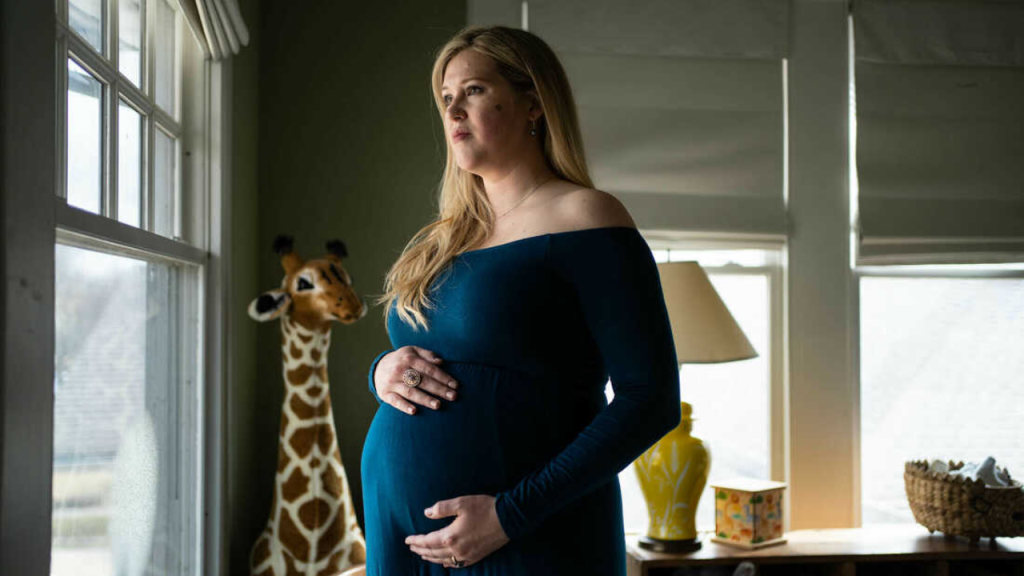Texas Court Allows Abortion for Woman with Fatal Disordered Fetus!
In a groundbreaking decision, a Texas judge has granted permission for a woman to terminate her pregnancy under the state’s stringent abortion laws. This case is notable as the fetus has been diagnosed with a fatal disorder, marking a significant moment in the ongoing abortion rights debate.
Kate Cox, a 31-year-old mother from the Dallas area, faced an agonizing situation when she learned that her unborn child had trisomy 18, a chromosomal disorder often resulting in stillbirth or the early death of an infant. The diagnosis was confirmed by an amniocentesis, revealing that the fetus had three copies of chromosome 18, instead of the usual two.
This condition often leads to severe complications, including heart, kidney, and spinal problems. Faced with this devastating news, Cox sought legal recourse. The Center for Reproductive Rights stepped in, filing an emergency lawsuit on behalf of Cox and her husband. In the suit, it was highlighted that Cox had already undergone two cesarean sections, and continuing the pregnancy posed a significant risk to her health and future fertility.
The decision by the Texas judge is a rare exception under the state’s strict abortion laws, which have been among the most restrictive in the United States since the passage of SB8 in 2021. This law bans abortions after about six weeks of pregnancy, with few exceptions.

The complexity of the legal landscape in Texas was further highlighted by the cases of Amanda Zurawski and Samantha Casiano, which came to light amidst ongoing legal challenges against the state’s strict abortion laws. Zurawski, who attended President Biden’s State of the Union address, shared her harrowing experience of being denied an emergency abortion at 18 weeks of pregnancy, leading to severe medical complications, including two bouts of sepsis.
As a result, she faced permanent fallopian tube closure and complex reproductive challenges. Her testimony underscored the dire need for clarity and compassion in laws governing medically necessary abortions. Casiano’s case further illuminated the emotional and physical toll of the current laws.
Forced to carry a pregnancy to term despite a 100% fatal fetal condition, her emotional testimony highlighted the excruciating choices faced by women under these restrictions. Her fears about legal repercussions and financial burdens echoed the concerns of many in similar situations, spotlighting the need for accessible and safe medical options for women across Texas.
In response to these and other cases, Travis County Judge Jessica Mangrum ruled that women experiencing severe pregnancy complications should be exempt from the state’s abortion bans. However, this decision was quickly challenged, leaving many in a state of uncertainty.
The Texas legal landscape on abortion has become a focal point of national attention, reflecting a broader struggle over reproductive rights in the United States. The ruling in Cox’s case, which allowed her to terminate her pregnancy due to the fatal fetal diagnosis, marks a significant moment in this ongoing debate.
It raises crucial questions about the balance between legal restrictions and the need for compassionate, individualized medical care. Former Senator Rick Santorum’s experience, whose daughter was born with trisomy 18, brings an additional personal perspective to this complex issue, highlighting the diverse and often deeply personal implications of these laws.
The Texas legal battles over abortion rights, exemplified by the cases of Cox, Zurawski, and Casiano, underscore the urgent need for a nuanced approach to abortion legislation. These stories not only reflect the medical and emotional complexities involved but also the critical importance of considering individual circumstances in the formulation and application of laws that profoundly impact women’s lives and health.

Read More: Woman Asks State Supreme Court to Declare Abortion Ban Limits Clear!
Increasing Numbers of Influenza Cases in Middle Tennessee Have Sparked Worry!
The CDC Director Urges Vaccinations Over Increasing Respiratory Diseases in Georgia!

